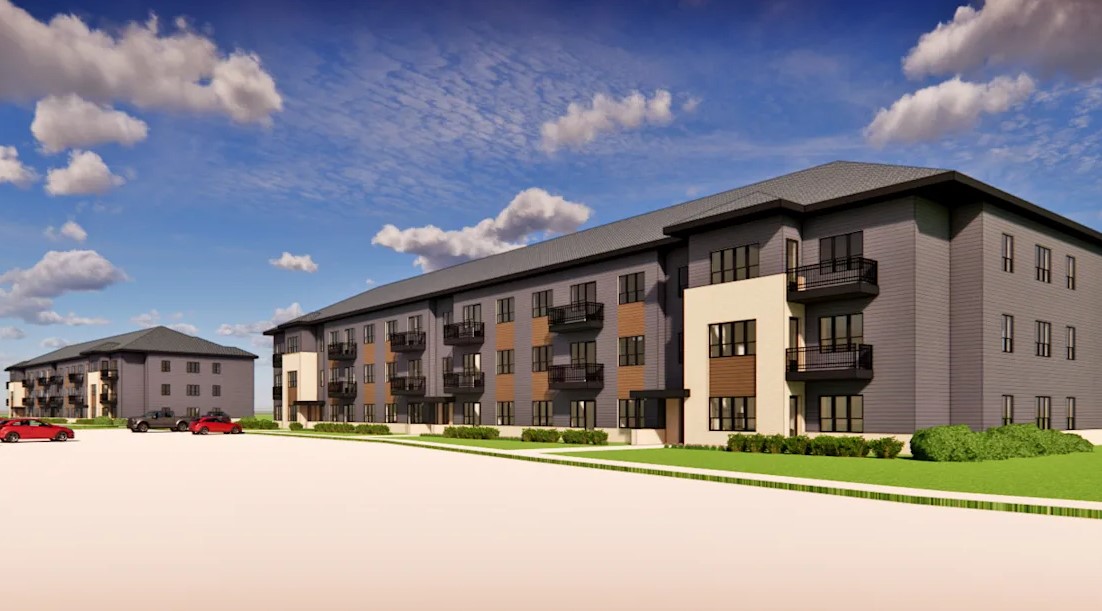Over the years since George Lane founded the multifamily company in Atlanta, its platform has grown to include development, investment, asset and property management, renovation and construction of a wide variety of apartments, condos and town homes, building more than 100 multifamily communities over its more than three decades in the business.
But it will be Lane’s basic expertise at re-positioning and rehabbing ailing apartment assets and managing them well in a challenging economy that will bring the greatest value to the company next year.
“It’s going to be a very, very demanding year,” Donges predicted, a year when only the most prestigious new projects in the most promising markets will get funded. Construction financing will take longer than ever to acquire because banks are being much more conservative in their underwriting and public institutions’ investment committees are setting their standards at levels almost unreachable in today’s turbulent economy.
At Lane, the 20 or so projects already funded and in some stage of the development process will go forward. But the real opportunities next year will be found in turning around other companies’ failures, which will become more obvious as the recession moves along, bringing with it the softening occupancy and rents everyone in the apartment industry expects in the months ahead.
As the recession deepens, apartment owners are sure to start questioning whether they have the right management team to get them through the tough times while preserving value, avoiding occupancy loss, keeping the traffic coming through the doors and achieving the highest NOIs possible in a down market, predicts Donges, who already is seeing the tip of that iceberg.
“We’re getting calls from owners that maybe feel that they had a good management company for the good times, but maybe not a good company for the down times. They’re looking to stay ahead of the curve and saying, ‘Maybe this is the time I need to switch to somebody that knows what they’re doing in the tougher times and really can focus on my property.’ They’re getting nervous,” said Donges, who believes Lane’s long and successful history as a third-party manager will benefit the company when those nervous owners start looking around for a management company that can keep them afloat until the economic tide turns.
Lane Management LLC, the division that is rooted in the management business George Lane launched in 1988, currently oversees 6,000 in 21 Lane Company apartment communities and fee manages another 22,000 apartments for owners of another 112 rental properties.
And significant opportunities will present themselves next year in the rehab and re-positioning of assets suffering from capital starvation by owners who burned through their interest reserves trying to survive, but now are on the verge of throwing in the towel. Whether spurred into action by their own liquidity needs or pushed into sales mode by their banking relationships, Donges believes those sales-side hold- outs likely will see their chickens come home to roost next year, forcing them to drop their prices to levels that companies like Lane will be willing to pay.
At that point, buyers should be ready to execute quickly, with capital already in place, and Lane’s CEO believes he has that end of things covered. In addition to the $7 million to $8 million of equity in company’s fourth investment fund, which has another couple of investors ready to come in, Lane is on the verge of an agreement with a new capital partner with funds ready for acquisition of value-added deals. Donges expects to announce that new partnership at the beginning of next year.
Anyone who buys properties that have been under prolonged stress must act quickly to turn them around, which makes Lane an especially good partner in the current environment, thanks to the company’s diversified platform, Donges said. Lane has the management and the rehab capabilities that will be needed in the very challenging scenario that maintenance-starved properties present. “You’ve got to take them over and you’ve got to move, and move quickly, once you’ve got the capital re-positioned and the whole property recapitalized, to take advantage of the opportunities. You’ve got to make sure you’ve underwritten that property carefully and you know where the pitfalls are,” he warned.
On the development side, Lane, like most other private multifamily companies whose platforms include ground-up construction, saw some cutbacks in both development plans and staffing earlier this year, when it became evident to industry veterans that things were not going well on the capital markets scene.
“I think we’ve pretty much paralleled the rest of the industry in reducing our staff and overhead in relationship to development and investment, those areas where it is increasingly more difficult to get deals done and we’ve made sure that we’ve reduced our staff to fit the deals we currently have,” Donges said.
“We are working in some capacity on more than 20 development deals, but we’re pretty much like everyone else, sensing that you’ve got to really adjust and realign your team and be proactive because you’ve got to take what the market will give you right now, and the capital markets are not being very gracious,” Donges said. The cutbacks last spring included scaling back development plans by about one-third, cutting the company’s development partners from 14 to nine, closing two recently opened regional offices in Washington D.C. and Phoenix and reducing staff at the company’s headquarters to reflect the overall reduction of about five percent of Lane’s workforce.
Around the same time as the cutbacks occurred, the company began working on a plan to offer some flexible work schedule options to make life easier for employees facing rising prices at the gas pumps. The program that went into effect in September offers a menu of work schedule alternatives that include telecommuting one day a week, starting work earlier in the day to avoid the rush hour traffic on both ends of the commute and working four 10-hour days a week rather than the traditional five eight-hour days.
“We have a significant number of employees that are participating in the program and I think we’re one of the few in the industry that has taken this progressive step, which fits in with the whole green movement, in addition to being employee friendly,” he said of the program he believes will reduce employee turnover as it boosts morale.
Furthermore, the work-at-home part of the program, which is especially well-suited for those who spend a lot of time on the computer doing things like analysis or accounting or IT development, has disproved the old notion that people don’t get as much work done at home as they would in the office, he said.
“What we’ve discovered is that people are actually more productive and more satisfied with their jobs. They actually tend to work harder because they’re working during the day and then they’re putting their kids to bed and working at night. And, for at least that one day a week, they don’t have to get in that car and drive an hour or more to work and then do it again in the evening,” said Donges.
Having set in motion those initiatives that will help get the company through the difficult months ahead, Lane’s CEO is looking forward to a much brighter future as the excellent demographic picture for multifamily comes into focus over the next few years.
Despite the coming recession-related softness in the sector, ultimately the fundamentals of the multifamily real estate market are good and the demographics that are the foundation of the industry promise a phenomenal turnaround as the century enters its teen years and a huge swell of echo boomers reach their twenties.
“This is the highest year in the history of America for 18-year-olds.
There are more than 4.3 million of them and many of those kids are in college now and, as they start to roll out into the economy in 2010 and 2011, there will be a shortage of new conventional apartments because only about 30 percent of what we thought was going to be developed is actually going to start in 2009 and 2010. Those that do start will hit the reversion curve at exactly the right time, so we will have a shortage of apartments in 2010 and 2011 in many markets and Orlando is one of them,” Donges said.
And even today, the gloom and doom scenario really isn’t quite as bad as expected, at least from Lane’s point of view, even in markets like Orlando, a poster child for the single-family housing bubble disaster, where Lane Florida, a division of the company that was created in 2006 to pursue development opportunities in the Sunshine State, started lease-up in August at the 384-unit Verano in Osceola County near Walt Disney World.
“It’s kind of bucking what we’ve heard about Orlando,” said Donges of the better-than-expected lease-up pace of 30 units a month. “I think it really does come down to sub-markets and the differentiation of assets,” he said, noting that Verano, which offers one-, two- and three-bedroom apartments and boasts lush landscaping that includes lakes with fountains and picnic areas, is right off the Florida Turnpike in Kissimmee.
The community’s location provides residents with easy access to local entertainment magnets that include not just Disney World, but also Sea World, Aquatica, Universal Studios and downtown Orlando.
Designed by The Preston Partnership, Verano offers a full amenities package from pool to fitness center The units that range from 796 sq. ft. to 1,351 sq. ft. and rent for $749 to $1,229 feature finishes like granite bar tops and ceramic tile in the kitchens, full-sized washers and dryers, walk-in closets and screened porches and balconies.
Lane’s second Florida development started in downtown Orlando at the end of September. “In addition to being the only apartment high-rise starting in Downtown this year, we are very excited about having the first green residential building in Orlando,” said Lane Florida Regional Development Partner Mike Mulhall when the 19-story community broke ground.
The 183-unit Montage that was designed by EDI Architects of Houston will be built according to U.S. Green Building Council guidelines with the intention of earning a silver LEED certification. The project’s innovative, environmentally friendly building materials and construction techniques are expected to result in lower energy use and cleaner air for the community as a whole and lower utility bills for the individual tenants.
Located just one block south of Lake Eola, The Montage, where the ground floor will house 8,000 sq. ft. of retail space and the rooftop will feature a 24-hour controlled-access fitness center and club room and a pool with stunning views of the city’s skyline, is the first of three rental towers Lane Florida plans to develop in downtown Orlando.
Completion is scheduled for the spring of 2010, when Donges expects the economic recovery to be in full swing and apartments to be in short supply. “So we see tremendous value for those deals that are already in place and will be coming out in early 2010,” he said.
However, he’s not discounting the probable success of deals Lane plans to deliver next year like the 312-unit No. 10 Park, a $60 million upscale apartment community that broke ground last May in Atlanta’s rapidly growing Central Perimeter area. “I think everyone’s counting on things getting incrementally better as ’09 moves along, so April 1 may be perfect a perfect time to start lease-up,” he said of the community that will be completed next fall.
Although Lane has development deals in the works in most of the company’s markets in the Northeast, Southeast and Southwest, Donges expects it will be very difficult next year to find construction financing for any new multifamily deals, no matter how good the location or how compelling the story, so he plans to stay focused, until the recovery, on value-added opportunistic acquisitions and property and asset management — the core competencies in which the company is rooted.













